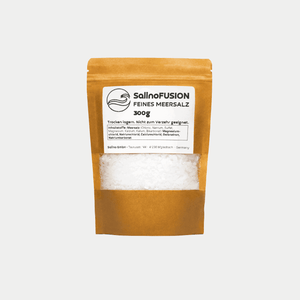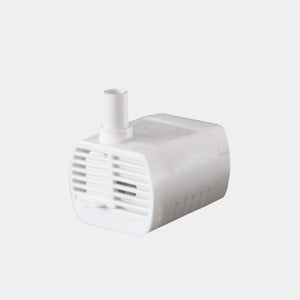Where air begins, a new everyday life often begins
There are spaces that are more than just places. They are places of retreat, meeting places, sources of energy, or creative workshops. And sometimes they are also sites of stress: dry, heated air in winter, stuffy air in small offices, damp basements, air-conditioned hotel rooms. The quality of the air we breathe every day has far-reaching consequences than we often realize. We're not just talking about fresh air—we're talking about the composition of the air itself.
Salty air, in particular, can play a role here. Its beneficial effects have been known for centuries, whether on the North Sea and Baltic Sea or in the graduation towers of traditional spa towns. But what if you could experience this exact air quality not only on vacation, but also integrate it into your daily life – in various living spaces?
This article explores six specific spaces where salty air, with the help of a mini-salt plant, sets new standards. Spaces you don't just enter, but experience anew – because breathing suddenly feels different. Freer. Deeper. Easier.
Home – Where relaxation begins
The bedroom – an underestimated health room
 It's the place where we spend more than a third of our lives: our bedroom. Yet, the room where we're supposed to regenerate is often neglected. Dry air from heaters or air conditioners, dust particles, pollen, even pet dander—all of these things put a strain on our respiratory system while we sleep.
It's the place where we spend more than a third of our lives: our bedroom. Yet, the room where we're supposed to regenerate is often neglected. Dry air from heaters or air conditioners, dust particles, pollen, even pet dander—all of these things put a strain on our respiratory system while we sleep.
The salty air of a mini-salt mine can help here. Salt not only has an expectorant and anti-inflammatory effect on the respiratory tract—it can also help deepen and calm nighttime breathing. People with asthma, chronic bronchitis, or allergic rhinitis often report improved sleep and less coughing. Healthy individuals also benefit: The respiratory tract regenerates better, nasal mucous membranes don't dry out, and snoring can decrease. And with sleep, energy returns.
The living room – new air quality for the heart of the home
The living room is a place where people meet. It's where we laugh, argue, talk, and read. But air quality is particularly sensitive where people gather. Scented candles, kitchen fumes, carpets, and upholstered furniture all release pollutants without us noticing.
A mini-saltworks operates here in the background, almost invisibly. No hissing, no humming. Just a fine, salt-enriched air that gently transforms the space. If you feel closely, you'll notice it: a feeling of freshness that comes not from open windows, but from within. The air becomes clearer, calmer, noticeably different.
The children’s room – learning to breathe from the beginning
 Toddlers and babies are particularly sensitive to indoor air quality. Their respiratory systems are not yet fully developed, and their immune systems are still developing. Dry, heated air in winter or high humidity in summer can quickly lead to irritation, coughing, or sleep problems.
Toddlers and babies are particularly sensitive to indoor air quality. Their respiratory systems are not yet fully developed, and their immune systems are still developing. Dry, heated air in winter or high humidity in summer can quickly lead to irritation, coughing, or sleep problems.
Studies show that salty air can soothe mucous membranes and strengthen the immune system of the respiratory tract. A mini saline bath in the child's room creates an air climate that allows for free breathing without the need for artificial humidification or ultrasound – a point that is especially important for pet lovers and parents. About us.
Working and arriving – where air supports performance
The workplace – clear air for clear thoughts
 We spend a large part of our day at our desks. And although ergonomic chairs, height-adjustable desks, and daylight lamps have long been established, the air quality in many offices is still underestimated. It's often dry, stale, and air-conditioned—a breeding ground for concentration problems, headaches, and irritated airways.
We spend a large part of our day at our desks. And although ergonomic chairs, height-adjustable desks, and daylight lamps have long been established, the air quality in many offices is still underestimated. It's often dry, stale, and air-conditioned—a breeding ground for concentration problems, headaches, and irritated airways.
Salty air can bring about a quiet but noticeable change here. It's not intrusive, but rather a companion—like an invisible ally. Fine salt particles bind pollutants, soothe the respiratory tract, and even have a mild antibacterial effect. The mini saline can be placed on any desk, requires little maintenance, and is neither disturbing nor disruptive with its noise or striking design. Our product and its... And sometimes just being aware of it is enough: I breathe better here—so I work more clearly, too.
The hotel lobby – first impression with long-term effects
 When entering a hotel, the first thing you notice is the air. Does it smell stale? Or fresh? Is it dry? Or pleasantly humid? In the hotel industry, these very nuances often determine the feeling of arrival or alienation. A subtle salty whiff in the air—barely noticeable, but present—can work wonders. It suggests not only purity and freshness, but also exclusivity.
When entering a hotel, the first thing you notice is the air. Does it smell stale? Or fresh? Is it dry? Or pleasantly humid? In the hotel industry, these very nuances often determine the feeling of arrival or alienation. A subtle salty whiff in the air—barely noticeable, but present—can work wonders. It suggests not only purity and freshness, but also exclusivity.
The mini-salt plant is more than just decoration. It subtly and sustainably changes the room climate without being intrusive. Guests with sensitive respiratory systems—allergy sufferers, asthmatics, or simply frequent travelers—often notice the difference immediately. Those who feel welcome not only enjoy staying—they also return.
Wellness areas – atmosphere that breathes
 Whether in a spa, sauna, or relaxation room, breathing is part of the experience in wellness areas. The air shouldn't just be warm or humid—it should be healing. Here, the salty air of the mini-salt works meets its natural environment. It enhances the feeling of cleansing and regeneration without additional technology or noise. Especially when combined with aromas like eucalyptus or Swiss stone pine, a space is created that feels deeper—because it begins from within.
Whether in a spa, sauna, or relaxation room, breathing is part of the experience in wellness areas. The air shouldn't just be warm or humid—it should be healing. Here, the salty air of the mini-salt works meets its natural environment. It enhances the feeling of cleansing and regeneration without additional technology or noise. Especially when combined with aromas like eucalyptus or Swiss stone pine, a space is created that feels deeper—because it begins from within.
Ready for Part 4? Then we'll look at how salty air is opening up new possibilities in restaurants and public spaces. Topic: Enjoyment and Community – Spaces to Stay.
Enjoyment and community – spaces to stay
Restaurants – when air enhances taste
A good meal appeals to all the senses—not just the palate and eyes. The nose also plays a role. But what happens when the air in the dining room is heavy? When cooking smells stagnate, heated air makes breathing difficult, or poor ventilation overpowers the delicate aromas?
In moments like these, the power of salty air becomes apparent. Salt not only clears the respiratory tract—it can also enhance the olfactory experience. In restaurants that value refinement and freshness, the mini-salt mine becomes a silent mediator: It reduces odor pollution, soothes sensitive airways, and creates a microclimate that encourages guests to linger longer. And those who feel comfortable enjoy themselves more consciously—including their next glass of wine.
Cafés, co-working spaces and waiting areas – an invitation to take a breather
It's the small, everyday spaces that often have to perform a lot: the café at the train station, the co-working space between appointments, the waiting area at the doctor's office or in the office. This is where many people meet, where people breathe, talk, and sometimes even cough.
Especially in these semi-public spaces, good air quality is rarely noticed – but poor air quality is very likely. The mini-salt plant can be a subtle game-changer here: It works without a filter, requires minimal maintenance, and noticeably increases the salt content of the room air. The result isn't clinical freshness, but rather a gentle sigh of relief. Visitors feel more comfortable, the space appears calmer and healthier. And those who feel comfortable stay – or come back.
Meeting spaces for sensitive groups – kindergartens, nursing homes, therapy rooms
Some people need special air. Children with respiratory diseases, elderly people with weakened lungs, patients in rehabilitation facilities. Here, every breath counts. Dry air or airborne irritants can quickly lead to problems – from coughing to the worsening of chronic conditions.
Salty air has long been used in medical settings, for example in salt caves or inhalation therapies. The Mini Saline quietly brings this principle into spaces where healing or care is the focus. It supports without dominating – and gives the space an added sense of care, expressed not in brochures, but in the experience.
Would you like to continue with the final part? There we'll round things off with a conclusion, outlook—and a discreetly embedded product option.
Conclusion – and a new way of thinking about air
We live in a time where we can no longer take clean air for granted. Where air conditioners run, filters hum, and the need for purity grows. But what we often seek is more than just fresh air – it's an atmosphere that's good for us. That supports us, relieves us, and allows us to relax.
The mini-salt plant opens up new avenues here. Not as an impressive technical device, but as a silent companion that transforms spaces – and thus our experience. Whether in the bedroom, the hotel lobby, the workplace, or a café: wherever people breathe, space can be created for healing, relief, and stillness. Salty air is not a trend, but a return to what has always been good for us.
A discreet note at the end
Anyone who wants to discover this principle for themselves – in everyday life, without renovation, without effort – will find the Mini Saline a way to bring concentrated sea air into their own home. The device operates silently, without filters, with minimal energy consumption, and adapts discreetly to any environment. It's not a cure-all, but a quiet stimulus. For better air. And perhaps a bit more quality of life.



